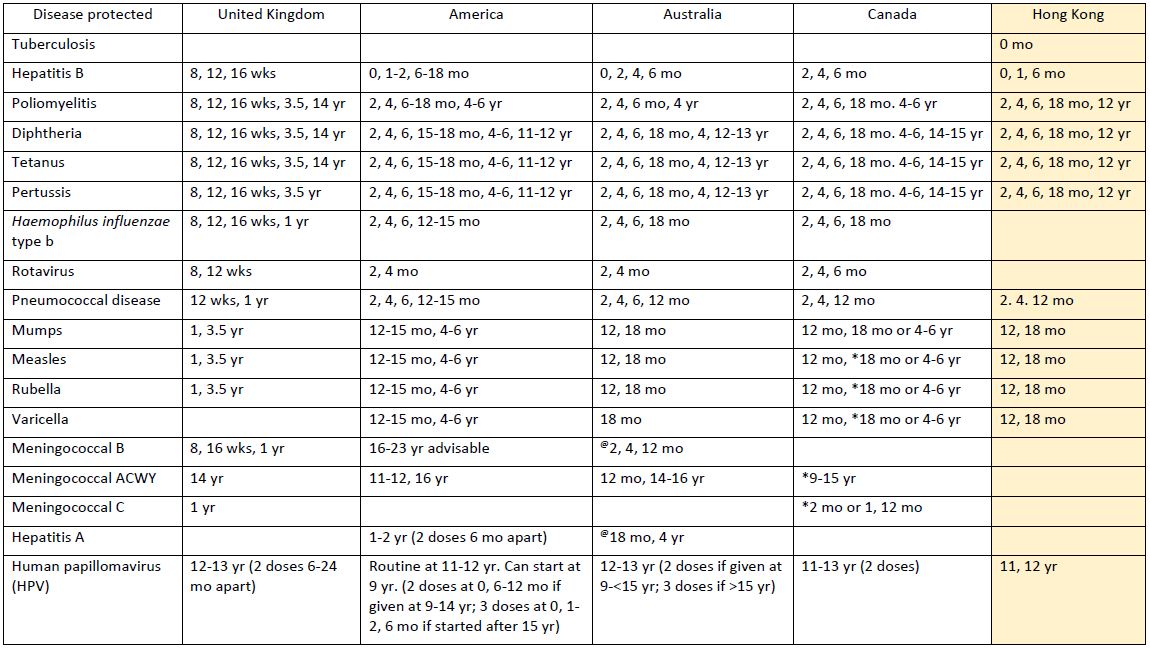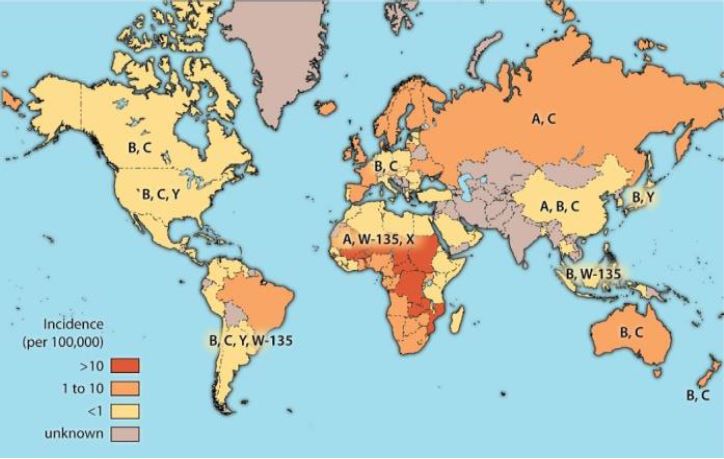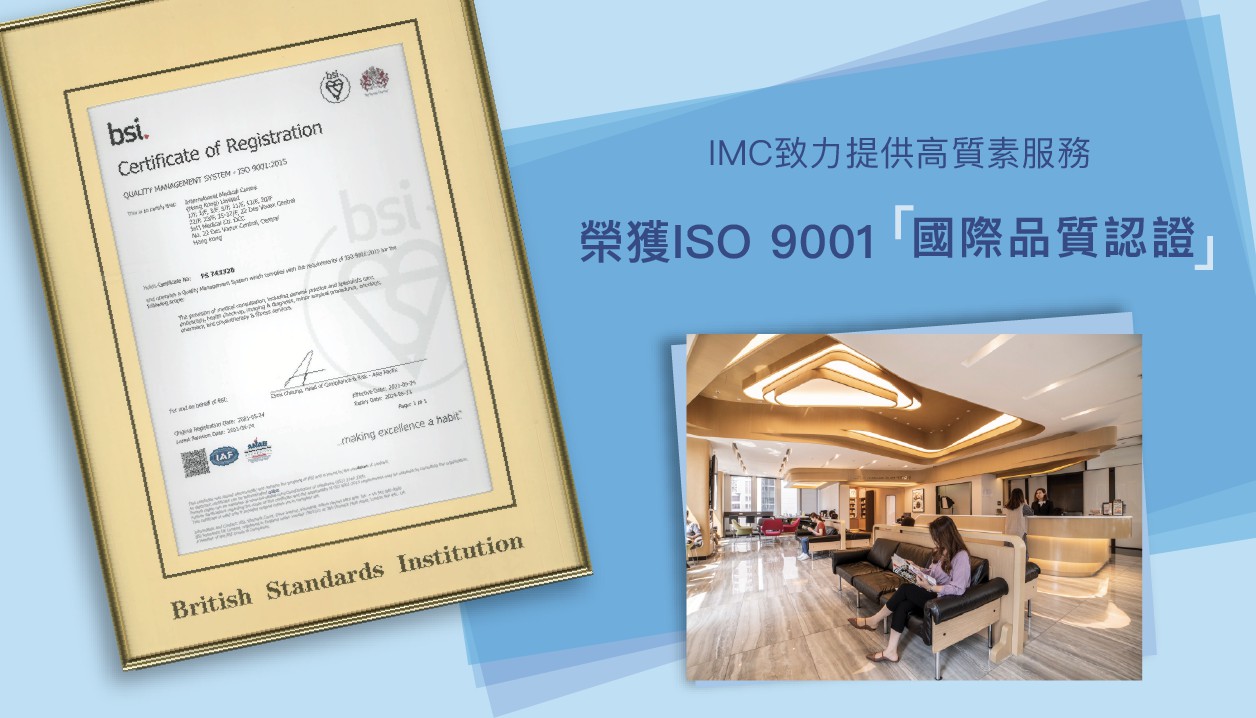Advice on Vaccination when you study abroad
Publish date:2021-10-27
Advice on Vaccination when you study abroad
When you plan to emigrate with your family to another country, or when you decide to send your children to study abroad, there are many things to prepare. Besides deciding which country and city to stay, looking for accommodation for the family and appropriate school for the children, you also need to seek advice on health insurance and vaccination requirements in that country.
Different countries have their own vaccination schedules for children. All western countries generally cover vaccination against poliomyelitis, diphtheria, tetanus, pertussis, hepatitis B, Haemophilus influenzae type b (Hib), pneumococcal disease, mumps, measles and rubella, while most countries also include vaccines for varicella, rotavirus infection and meningococcal disease. Hong Kong has a similar vaccination schedule, but does not include vaccines against Hib, rotavirus and meningococcal diseases. It is thus important for the parents to ensure their child is adequately covered according to the vaccination schedule in that country.
The following table 1 is a summary of the immunization schedule for children in the United Kingdom, America, Australia and Canada. Vaccines that are not included in the schedule in Hong Kong will be discussed.
Table 1: Child and Adolescent Immunization Schedule

As illustrated in table 1, Hong Kong provides a comprehensive immunization programme for children and adolescents based on local epidemiological data. However, there are vaccines that are not provided in the public sector in Hong Kong, but are provided in western countries. These are important when children visit these countries, as they will not be protected against these infections. Details about these vaccines are given below.
Haemophilus influenzae type b (Hib) infection
Haemophilus influenzae type b (Hib) is a bacterium which can cause serious invasive disease especially in young children. H. influenzae colonizes the upper respiratory tract of humans and is transmitted person-to-person by inhalation of respiratory droplets or by direct contact with respiratory tract secretions.
Over 90% of invasive H. influenzae disease occurs in children < 5 years of age. The risk of infection among older children is relatively low. Meningitis is one of most invasive and life-threatening infections associated with Hib infection, in which the case-fatality is 3-6% despite appropriate antimicrobial therapy, and hearing impairment or neurologic sequelae occur in 15-30% of the survivors. Hib infection can also affect other parts of the body, causing epiglottitis, pneumonia, septic arthritis and cellulitis, and less commonly, osteomyelitis and pericarditis.
The incidence of invasive Hib infection is low in Hong Kong. The annual number of reported cases ranged from 0 to 6 between 2008 and 2018. Hence the Hong Kong Government has not included Hib in the routine infant immunization programme. However, the disease incidence of Hib is much higher in western countries and routine vaccination is included in their national programme.
It is advisable for young children to be immunized against Haemophilus influenzae b if the parents plan to emigrate to western countries.
Rotavirus Infection
Rotavirus is one of the most common causes of diarrhoea among infants and young children worldwide. The disease is more commonly seen in cooler months. In a surveillance study in Hong Kong in 2016 showed that Rotavirus was detected up to 21% of faecal specimens during winter months. In a hospital-based surveillance study in 2005 showed that the estimated rates of hospitalization for rotavirus infection was 8.8 admissions/1000 children <5 years old and 18.4 admissions/1000 children <1 year old.
The disease is characterised by fever, vomiting, abdominal pain and watery diarrhoea. Severe infection may result in dehydration, electrolyte imbalance, shock and even death. Rotavirus can also cause gastroenteritis outbreaks in institutions, such as child care centres, kindergartens, hospital wards, elderly homes and correctional facilities.
In large clinical studies, Rotavirus vaccine demonstrated over 90% protection against severe rotavirus gastroenteritis and hospitalization. Hence, Rotavirus vaccine is advisable for infants before 6 months of age to prevent Rotavirus gastroenteritis and is routinely given in western countries.
Meningococcal infection
Meningococcal infection is caused by the bacteria Neisseria meningitides. The disease is mainly transmitted by direct contact through respiratory secretions from infected persons. These illnesses are often severe and can be deadly. They include infections of the lining of the brain and spinal cord (meningitis) and bloodstream infections (septicaemia). Meningococcal septicaemia is characterised by sudden onset of fever, intense headache, purpura, shock and even death in severe cases. Meningococcal meningitis is characterised by high fever, severe headache, stiff neck followed by drowsiness, vomiting, fear of bright light and rash. It can cause brain damage or even death. Survivors with brain damage may suffer from intellectual impairment, mental retardation and hearing loss. Even with appropriate antibiotic therapy, the fatality of invasive meningococcal infection is high.

Of the 12 Neisseria meningitides serogroups identified, serogroups A, B, C, W, X and Y are responsible for the majority of the disease. In North America, Australia and Europe, majority of cases were accounted by serogroups B, C and Y, though increasing numbers of serogroup W have been observed in some areas. In Asia, five major serogroups (A, B, C, W and Y) were reported to be variedly present in different countries.
After the introduction of meningococcal vaccination, the incidence of meningococcal meningitis has decreased, especially in countries where the vaccine is included in their national programme.
The United Kingdom is one of the first countries to include a comprehensive meningococcal vaccination programme for children, with introduction of Meningococcal B vaccination in the first year of life and Meningococcal ACWY vaccine at 14 years of age.
In USA, Meningococcal ACWY vaccine is mandatory, prior to admission of new students to many universities. In UK, all university students under 25 years are advised to be immunised against Meningitis (ACWY) on a voluntary basis.
It is advisable for students in Hong Kong to be immunized against Meningococcal meningitis before going abroad to study.
Hepatitis A Infection
Hepatitis A Virus is transmitted primarily by the faecal-oral route, that is, when an uninfected person contacts or ingests objects, food or water that has been contaminated with the faeces of an infected person. The virus can also be transmitted through close physical contact with an infectious person including sexual contact and not limited to anal-oral contact.
Typical signs and symptoms of hepatitis A include fever, malaise, loss of appetite, diarrhoea, nausea, abdominal discomfort and jaundice. Adults have signs and symptoms of illness more often than children, and the severity of disease increases in older age groups. Hepatitis A infection does not cause chronic liver disease and is rarely fatal, but it can cause fulminant hepatitis and acute liver failure.
It is advisable for children and young adults to be vaccinated against hepatitis A especially those who are hepatitis B carriers.
Human papillomavirus (HPV)
HPV is the name of a group of viruses that includes more than 150 genotypes. Around 40 of these viruses infect the genital area of men and women. HPV can cause premalignant changes and malignant cancers of cervix, vagina, vulva and anus. HPV vaccine is a prophylactic vaccine to prevent cervical cancer as well as other HPV-related cancers or diseases. In Hong Kong, HPV-16, 18, 31, 33, 45, 52, 58 accounted for about 90% of cases of cervical cancer. All the above seven genotypes are included in the 9-valent HPV vaccine.
It is important for teenagers to receive HPV vaccine before they reach adulthood.
Summary
Parents should consult doctors before moving abroad to ensure that their children are appropriately protected against infectious diseases by vaccination.
Source: Specialist in Paediatrics, Dr. Young Wan Yin, Betty

When you plan to emigrate with your family to another country, or when you decide to send your children to study abroad, there are many things to prepare. Besides deciding which country and city to stay, looking for accommodation for the family and appropriate school for the children, you also need to seek advice on health insurance and vaccination requirements in that country.
Different countries have their own vaccination schedules for children. All western countries generally cover vaccination against poliomyelitis, diphtheria, tetanus, pertussis, hepatitis B, Haemophilus influenzae type b (Hib), pneumococcal disease, mumps, measles and rubella, while most countries also include vaccines for varicella, rotavirus infection and meningococcal disease. Hong Kong has a similar vaccination schedule, but does not include vaccines against Hib, rotavirus and meningococcal diseases. It is thus important for the parents to ensure their child is adequately covered according to the vaccination schedule in that country.
The following table 1 is a summary of the immunization schedule for children in the United Kingdom, America, Australia and Canada. Vaccines that are not included in the schedule in Hong Kong will be discussed.
Table 1: Child and Adolescent Immunization Schedule

As illustrated in table 1, Hong Kong provides a comprehensive immunization programme for children and adolescents based on local epidemiological data. However, there are vaccines that are not provided in the public sector in Hong Kong, but are provided in western countries. These are important when children visit these countries, as they will not be protected against these infections. Details about these vaccines are given below.
Haemophilus influenzae type b (Hib) infection
Haemophilus influenzae type b (Hib) is a bacterium which can cause serious invasive disease especially in young children. H. influenzae colonizes the upper respiratory tract of humans and is transmitted person-to-person by inhalation of respiratory droplets or by direct contact with respiratory tract secretions.
Over 90% of invasive H. influenzae disease occurs in children < 5 years of age. The risk of infection among older children is relatively low. Meningitis is one of most invasive and life-threatening infections associated with Hib infection, in which the case-fatality is 3-6% despite appropriate antimicrobial therapy, and hearing impairment or neurologic sequelae occur in 15-30% of the survivors. Hib infection can also affect other parts of the body, causing epiglottitis, pneumonia, septic arthritis and cellulitis, and less commonly, osteomyelitis and pericarditis.
The incidence of invasive Hib infection is low in Hong Kong. The annual number of reported cases ranged from 0 to 6 between 2008 and 2018. Hence the Hong Kong Government has not included Hib in the routine infant immunization programme. However, the disease incidence of Hib is much higher in western countries and routine vaccination is included in their national programme.
It is advisable for young children to be immunized against Haemophilus influenzae b if the parents plan to emigrate to western countries.
Rotavirus Infection
Rotavirus is one of the most common causes of diarrhoea among infants and young children worldwide. The disease is more commonly seen in cooler months. In a surveillance study in Hong Kong in 2016 showed that Rotavirus was detected up to 21% of faecal specimens during winter months. In a hospital-based surveillance study in 2005 showed that the estimated rates of hospitalization for rotavirus infection was 8.8 admissions/1000 children <5 years old and 18.4 admissions/1000 children <1 year old.
The disease is characterised by fever, vomiting, abdominal pain and watery diarrhoea. Severe infection may result in dehydration, electrolyte imbalance, shock and even death. Rotavirus can also cause gastroenteritis outbreaks in institutions, such as child care centres, kindergartens, hospital wards, elderly homes and correctional facilities.
In large clinical studies, Rotavirus vaccine demonstrated over 90% protection against severe rotavirus gastroenteritis and hospitalization. Hence, Rotavirus vaccine is advisable for infants before 6 months of age to prevent Rotavirus gastroenteritis and is routinely given in western countries.
Meningococcal infection
Meningococcal infection is caused by the bacteria Neisseria meningitides. The disease is mainly transmitted by direct contact through respiratory secretions from infected persons. These illnesses are often severe and can be deadly. They include infections of the lining of the brain and spinal cord (meningitis) and bloodstream infections (septicaemia). Meningococcal septicaemia is characterised by sudden onset of fever, intense headache, purpura, shock and even death in severe cases. Meningococcal meningitis is characterised by high fever, severe headache, stiff neck followed by drowsiness, vomiting, fear of bright light and rash. It can cause brain damage or even death. Survivors with brain damage may suffer from intellectual impairment, mental retardation and hearing loss. Even with appropriate antibiotic therapy, the fatality of invasive meningococcal infection is high.

Of the 12 Neisseria meningitides serogroups identified, serogroups A, B, C, W, X and Y are responsible for the majority of the disease. In North America, Australia and Europe, majority of cases were accounted by serogroups B, C and Y, though increasing numbers of serogroup W have been observed in some areas. In Asia, five major serogroups (A, B, C, W and Y) were reported to be variedly present in different countries.
After the introduction of meningococcal vaccination, the incidence of meningococcal meningitis has decreased, especially in countries where the vaccine is included in their national programme.
The United Kingdom is one of the first countries to include a comprehensive meningococcal vaccination programme for children, with introduction of Meningococcal B vaccination in the first year of life and Meningococcal ACWY vaccine at 14 years of age.
In USA, Meningococcal ACWY vaccine is mandatory, prior to admission of new students to many universities. In UK, all university students under 25 years are advised to be immunised against Meningitis (ACWY) on a voluntary basis.
It is advisable for students in Hong Kong to be immunized against Meningococcal meningitis before going abroad to study.
Hepatitis A Infection
Hepatitis A Virus is transmitted primarily by the faecal-oral route, that is, when an uninfected person contacts or ingests objects, food or water that has been contaminated with the faeces of an infected person. The virus can also be transmitted through close physical contact with an infectious person including sexual contact and not limited to anal-oral contact.
Typical signs and symptoms of hepatitis A include fever, malaise, loss of appetite, diarrhoea, nausea, abdominal discomfort and jaundice. Adults have signs and symptoms of illness more often than children, and the severity of disease increases in older age groups. Hepatitis A infection does not cause chronic liver disease and is rarely fatal, but it can cause fulminant hepatitis and acute liver failure.
It is advisable for children and young adults to be vaccinated against hepatitis A especially those who are hepatitis B carriers.
Human papillomavirus (HPV)
HPV is the name of a group of viruses that includes more than 150 genotypes. Around 40 of these viruses infect the genital area of men and women. HPV can cause premalignant changes and malignant cancers of cervix, vagina, vulva and anus. HPV vaccine is a prophylactic vaccine to prevent cervical cancer as well as other HPV-related cancers or diseases. In Hong Kong, HPV-16, 18, 31, 33, 45, 52, 58 accounted for about 90% of cases of cervical cancer. All the above seven genotypes are included in the 9-valent HPV vaccine.
It is important for teenagers to receive HPV vaccine before they reach adulthood.
Summary
Parents should consult doctors before moving abroad to ensure that their children are appropriately protected against infectious diseases by vaccination.
Source: Specialist in Paediatrics, Dr. Young Wan Yin, Betty








